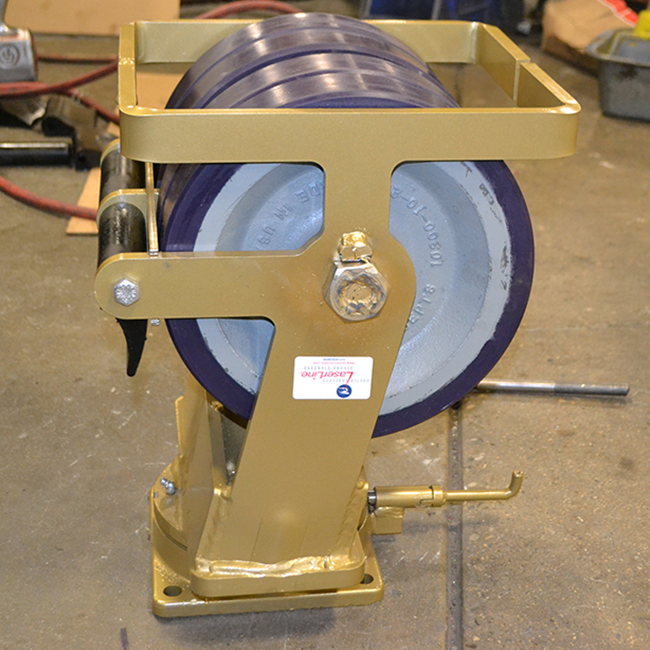

Caster wheel size, tire material, caster type, wheel hardness, and swivel leads are some of the features and benefits we will cover in this blog.
But first, let’s take a look at the wheel, one of the main components of a custom caster.
The force required to get a cart moving (push force) is a big challenge for the general population to move safely, especially when a cart’s load gets over 1,000-2,000 pounds. To reduce push force, increasing the wheel’s size will improve caster ergonomics to a point.
Another way to reduce the effort required to move a cart is by increasing the wheel diameter (for example, to 12 inches) and going with a smaller width (for example, 1.5 inches). The result is a smaller footprint and reduced push-pull force. Although a good solution, many carts have size limitations on the wheels that they can accommodate. If this is the case, other factors such as swivel leads and tire material come into play.
Swivel sections can also have an impact on how easy it is to push a cart. Traditional kingpin swivel casters carry the load on the kingpin, while kingpinless swivel casters concentrate the load on the ball bearings. Since the bearings float freely in the raceway with kingpinless casters, you can still get spikes in push/pull force but less than with a kingpin caster. The most efficient are maintenance-free swivels where the load is concentrated on the thrust bearing. This allows the load to disperse, reducing push/pull force and the chance of overexertion.
When choosing industrial casters and heavy-duty custom wheels, the wheel material is a major factor. Most casters are designed for environments less than 150° F, and we will cover the variety of polyurethane wheels typically used in this environmental range in a moment.
For high-temperature applications, wheel material, lubrication type, and bearing materials all play a factor. Increased temperatures affect caster performance by reducing operating life, increasing maintenance, or increasing the chance of premature failure.
Don’t Forget About Lubrication Rating.For applications at elevated temperatures, the type of lubrication used must also be evaluated. If the caster application temperatures exceed the lubrication’s rating, it will compromise the lubrication’s effectiveness. This can lead to increased friction in the wheel bearings as well as the swivel section bearings. This increased friction increases wear and reduces the life of the bearing components, which reduces the life of the industrial caster. |
When choosing a custom caster wheel, there are different levels of hardness. This hardness is measured in terms of Durometers. The two most common scales are type A and D. Higher numbers on the durometer scale mean the wheel has a greater resistance to indentation. Lower numbers mean less resistance and softer materials. Some of the most popular polyurethane wheels at Caster Concepts include:
Heavy-Duty T/R Polyurethane: Durometer 85A MDI. Benefits: A heavy-duty, tear-resistant wheel that offers maximum elasticity. Minimal pick-up of floor debris while providing great carrying capacity at a softer durometer.
Hard Polyurethane: Durometer 70D TDI. Benefits: Resistant to wear, non-marking, and is durable in tough applications with heavy loads.
T/R 95 Polyurethane: Durometer 95A MDI. Benefits: High-strength and tear resistant. Offer maximum elasticity for extended wear in difficult applications while providing superior ergonomics.
HPPT Polyurethane: Durometer 92A TDI. Benefits: Our high-performance, premium polyurethane tread is non-marking and lasts long in continuous use applications. The unique properties compete with any polyurethane on the market. Great for AGVs and other material handling applications.
T/R Polyurethane: Durometer 85A MDI. Benefits: Tear-resistant wheels and is non-marking. Known for not picking up debris and for holding up in rugged applications.
There are many factors that influence your decision when choosing a custom caster. If you have any questions, contact the material handling specialists at Caster Concepts. We are here to help you get the right caster for your needs.